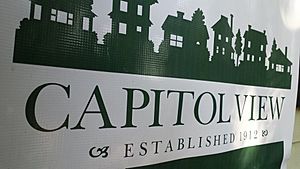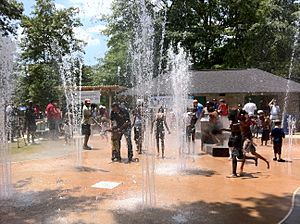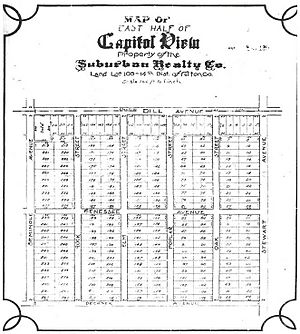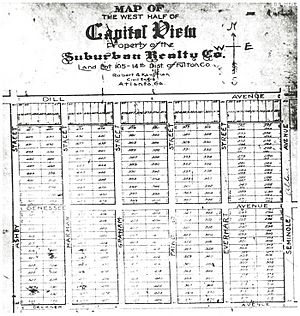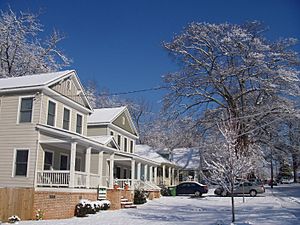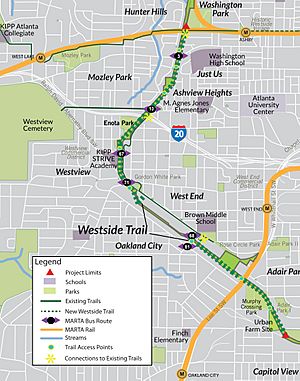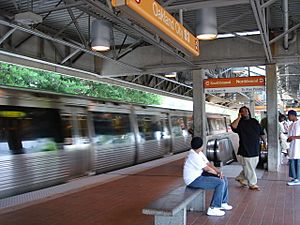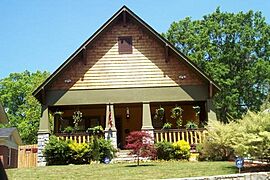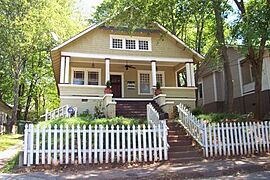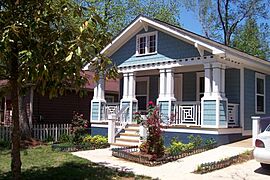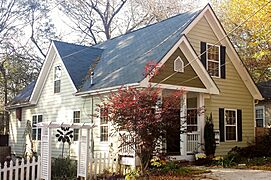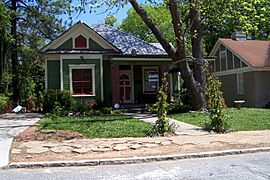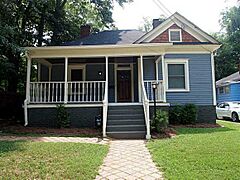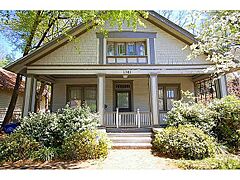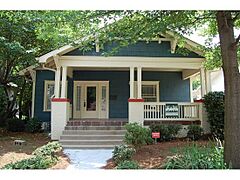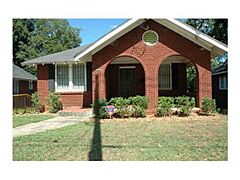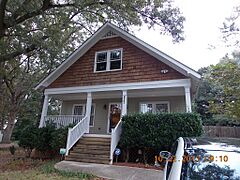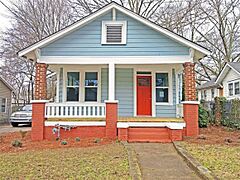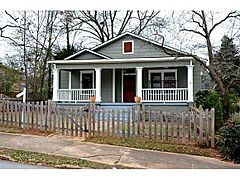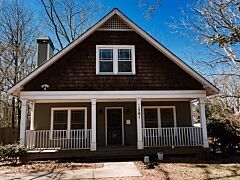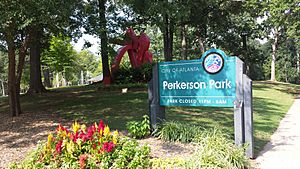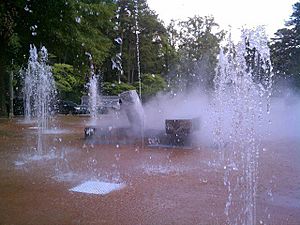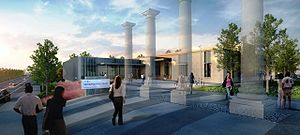Capitol View, Atlanta facts for kids
Capitol View is a historic neighborhood in southwest Atlanta, Georgia. It's about 2.5 miles from downtown and was named because you could see the Georgia State Capitol building from here.
Its borders include Metropolitan Parkway to the east, Lee Street to the west, and the Beltline to the north. To the south, the border follows Arden Street, Deckner Avenue, and Perkerson Park.
Capitol View has many homes built between 1915 and 1925, often called "craftsman bungalows." You can also find older "Queen Anne" style houses. Many of these historic homes are being fixed up, bringing new life and people to the area.
Contents
History of Capitol View
How Capitol View Grew
In the early 1900s, Capitol View was mostly farmland. There were no paved roads, electric lights, or sewer systems.
The community started growing between 1910 and 1914. This growth was helped by a new Masonic Temple and a pharmacy. By 1913, utilities like water and electricity were installed. Around this time, Capitol View officially became part of the City of Atlanta.
The trolley system in the early 20th century also helped shape the neighborhood. Streets were laid out in a grid pattern, making it easy to get around. Today, you'll find shops and businesses mainly along Dill Avenue, especially where it meets Metropolitan Parkway. Two important buildings there are the 1921 Masonic Temple and the 1927 Capitol View United Baptist Church.
Neighborhood Improvements
In the late 1990s, Stewart Avenue was renamed Metropolitan Parkway to help improve its image. Since then, efforts to fix up the area have helped homes become more valuable.
Future plans include redeveloping Fort McPherson into a mixed-use area with a movie studio. This will create new jobs for people living in Capitol View. The MARTA train station in Oakland City is also being updated to include new homes and shops.
With the BeltLine being built and more people wanting to live in the city, Capitol View is becoming a popular place to live, just like other neighborhoods in Atlanta.
The BeltLine Westside Trail
The Atlanta BeltLine is a big project that runs through the northern part of Capitol View. It's a path that goes under Metropolitan Avenue, connecting different neighborhoods.
In 2013, the City of Atlanta received a large grant to build the 3-mile Westside Trail. Construction started in 2014. This trail runs along the northern edge of Capitol View, connecting to Adair Park and Washington Park. It will have 14 entry points, making it easy for everyone to access.
The Westside Trail is a 14-foot wide concrete path. It includes lighting, security cameras, and signs to help people find their way. It also adds over 30 acres of new green space with many native trees. This trail connects four schools and four parks, giving residents of 10 southwest Atlanta neighborhoods easy access to public transportation and local businesses. The project took about 24 months to build.
Capitol View Neighborhood Association
The Capitol View Neighborhood Association (CVNA) works to make life better for people living in Capitol View. They also help keep the neighborhood looking good and growing.
They have groups that focus on safety, communication, and local business growth. Many activities are held regularly at Perkerson Park.
Getting Around Capitol View
Capitol View is just a few miles from Downtown Atlanta, Midtown Atlanta, Buckhead, College Park, East Point, and the Hartsfield-Jackson Atlanta International Airport. It's also close to major highways like I-75, I-85, I-20, and Metropolitan Parkway.
Public Transportation
Capitol View is on the Red and Gold Lines of the MARTA Train Rail system. The Oakland City Train Station is right in the neighborhood, making it easy to travel around Atlanta. MARTA bus stops are also located around the neighborhood.
Homes in Capitol View
Most homes in Capitol View were built in the first half of the 1900s. You can find different styles, like Country Victorians, Craftsman Bungalows, Cape Cods, and Colonials. Many houses have wide front porches and back decks with big backyards.
For many years, some homes and streets in the neighborhood needed a lot of work. But since the 2010s, many homes have been fixed up and improved. Today, you can find everything from homes that need a little work to fully renovated historic houses and even brand new homes.
As of May 2024, home prices range from $300,000 to $700,000, depending on the condition, size, and location. There are also some old industrial buildings that have been turned into modern apartments, called lofts.
Parks and Fun Activities
Capitol View is located between Perkerson Park and the future Atlanta Beltline park system. Perkerson Park is a large 50-acre park with picnic areas and a new playground. In 2010, a group of volunteers called "Friends of Perkerson Park" started a festival to raise money for park improvements.
The park also has:
- Basketball courts
- Tennis courts
- Baseball, Softball, and Little League fields
- A Sprayground (a fun water play area)
Perkerson Park is also home to one of only two disc golf courses in Atlanta.
Education in Capitol View
Atlanta Public Schools
The public schools for the neighborhood are:
- Perkerson Elementary School
- Sylvan Hills Middle School
- Carver Early College High School
Colleges and Universities
Many colleges are located close to Capitol View, including:
- Atlanta Technical College
- Atlanta Metropolitan College
- Morehouse College
- Clark Atlanta University
- Georgia State University
- Georgia Institute of Technology
Metropolitan Library
The Atlanta–Fulton Public Library System is building a new library in the neighborhood at 1332 Metropolitan Parkway. This new library is part of a big project to build and expand libraries across Fulton County. The project includes new libraries and updates to existing ones, with a total budget of $167 million. Each new library will also feature public art.
 | Precious Adams |
 | Lauren Anderson |
 | Janet Collins |


